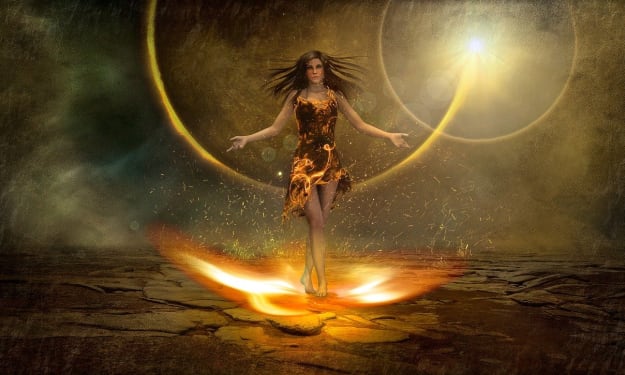Why are We Still Romantasizing Normal?
When we can instead undergo a rite of passage and become something better than normal

The trouble with normal
You hear it too, right? The sweet, sweet sound of normal calling us?
Or, if you don’t hear it, can you feel it? The pull to shore up the societal guardrails, hide the mess, and pretend we’re done with the work we needed to do? Brush the dust from our hands and return to our previously scheduled programming?
In normal land, white people pretend slavery ended over a hundred years ago. And global climate change is not our responsibility, but that of some generation far, far away.
Back in normal land, coronavirus is, for all intents and purposes, over. “Isn’t that nicer to believe?” normal whispers.
I hear normal calling and, like the tired, stressed, confused nation we are, I hear us all scrambling to get back into those arms.
But we’ve been knocked down for a reason: we’ve really f*cked things up.
“Normal” destroyed wildlife and our ecosystem with abandon. “Normal” made little to no space for diversity in its politics, entertainment, businesses, schools, or neighborhoods. “Normal” gave people leeway to call a police officer a “bad apple” rather than recognize that the entire policing structure needs to be rehauled —preferably without the built-in racism. Normal normalized income inequality, kids in cages, corruption (from the white wealthy elites), bullying, dehumanization, and all other sorts of atrocities.
During the height of the pandemic, an acquaintance of mine bragged that he had not allowed one sliver of his life to change. "I do the same things that I always have; nothing has changed for me," he said. I simply can't wrap my head around this mindset. When did refusing to change become something to be proud of?
The global pandemic is an initiatory event. As such, it is inviting us to move, collectively, through the entire process of a rite of passage—and become transformed into something better than we were before.
True initiation is a response to an inner calling; it requires that you face personal challenges heroically and experience a genuine rebirth into a new way of being.
~Alberto Villoldo
For the pandemic to be more than just a painful memory but an initiation inside a larger rite of passage, it must be acknowledged as what it is. Initiations that go unrecognized become unhealed emotional wounds, leaving us “partially initiated” until we return to finish what was started, or new events come along that challenge us even more.
People wax nostalgic all the time about “normal” or even a “new normal.” I worry when I hear this. There was nothing good about normal—new, or otherwise. I don’t wish for it back. Instead, I want to use the opportunity in front of us to transform, via a rite of passage.

Rites of passage
Cultures that have not been touched by “modernization” and “civilization” revere change—both for the individual and the collective. They refer to these transformational periods of time as rites of passage and honor them with sacred rituals and ceremonies. They understand that powerful life events help us grow and evolve.
Sadly, Western culture has mostly rejected the concept of a rite of passage. We celebrate some milestones—birthdays (depending on the age), anniversaries (big ones), and promotions—but brush over or bypass many other equally important markers. This is to our detriment. When we don’t honor girls when they get their first period, for example, they don’t get received into a circle of womanhood. And when we tease boys about their voices changing, we rob them of an opportunity to be initiated into a tribe of men to learn what it means to be a man.
Everyone grows older, but not everyone grows wiser. Because of our lack of ritual and ceremony around all kinds of changes, we might grow up, but we don’t necessarily grow into mature women and men. Some parts of us remain unfinished. This is true for society as well.
We are at a crossroads. We can continue to ignore the rite of passage opportunity the pandemic is presenting to us, turn back, and reinstate the habits of “normal.” Or, we can see the pandemic for the sacred opportunity it is—move forward, evolve, and become increasingly mature in both our actions and words.

Stages of a rite of passage
“Life itself means to separate and to be reunited, to change form and condition, to die and to be reborn. It is to act and to cease, to wait and to rest, and then to begin acting again, but in a different way.”
~Arnold van Gennep
According to Arnold van Gennep, one of the first scholars to study the rite of passage at the beginning of the twentieth century, there are three stages to a rite of passage. I share the definitions of each stage below.
Initiation
The initiation is the event itself. For an individual, an initiation could be anything from puberty, graduation, marriage, divorce, a promotion, etc. For a society, it might be a war, a natural disaster, the swearing-in of a new president, or the murder of a black man by a white police officer caught on camera.
Liminal stage
The liminal stage is the messy, in-between stage. We’re no longer who we were, but we’re not quite to the place we’re going. Our vision is cloudy, our path muddled. This stage has no timeline; acceptance is demanded. Often, this is when initiates turn back to the “devil they know” rather than continue through the confusion and the unknown.
Return
The return is when we’ve made it through the confusion and we’ve come back —to a tribe, a group, a family— changed forever.
Some of us mark our return with a tattoo or perhaps a special piece of jewelry (a wedding ring is a perfect example). Some people change their names to remind themselves and others that their previous self is no more.
There are many ways our culture could return. We could choose to invest more in virus and vaccine research, prioritize clean energy, and rectify the racial and class inequities the pandemic exposed. We could focus on doing everything possible to avoid future pandemics, rather than cross our fingers and hope it never happens again.
Because we’re a culture that doesn’t often perform rites of passage, I fear we do not understand the significance of our crossroads. And without understanding the significance, we won’t move through the stages and get to a place of true transformation. Instead, we’ll be forced to experience more initiations— more difficult and deadly pandemics are proving a possibility.
The easiest way to make this shift is to pause anytime you find yourself thinking romantically about “normal,” or hear someone else say it. And then, mindfully shift your attention away from going backward to imagining what’s possible if we step forward.
Nothing will ever be the same again, nothing should be, and that’s just the opportunity we need to transform our entire way of life.

About the Creator
Keri Mangis
Writer and philosopher. Deep end only. I write about culture/society, spirituality & personal growth, & empowerment. Award-winning author of Embodying Soul: A Return to Wholeness. https://kerimangis.com






Comments
There are no comments for this story
Be the first to respond and start the conversation.